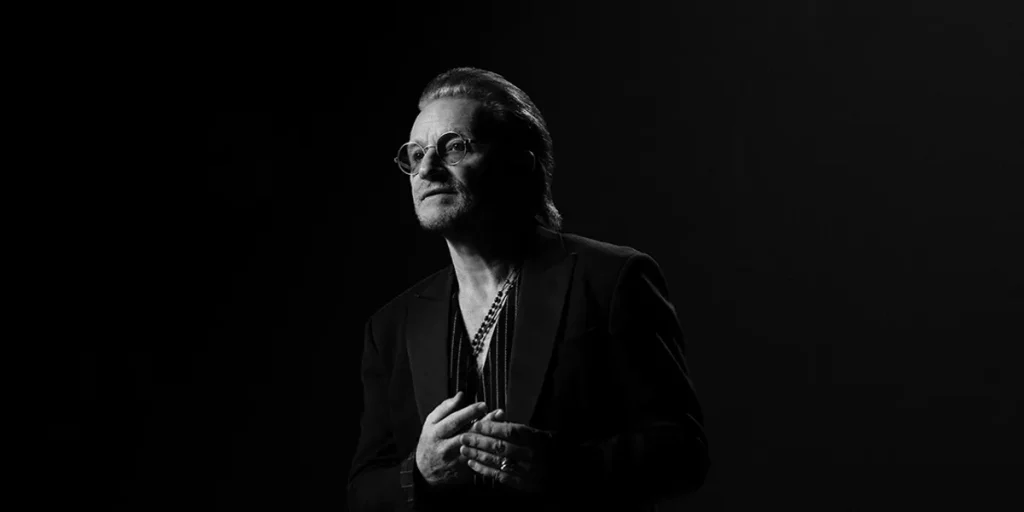The U2 frontman proves an inscrutable subject in Andrew Dominik’s slick but unrevealing concert confessional Bono: Stories of Surrender.
Director: Andrew Dominik
Genre: Documentary
Run Time: 86′
Cannes Premiere: May 16, 2025
Global Release Date: May 30, 2025
Where to watch: On Apple TV+
“Bono is a pox” is a famous phrase that can often be found daubed in graffiti around Dublin. Despite the unflattering comparison to a pimple, it rolls off the tongue, particularly in a north Dublin accent. It suggests that Ireland has fallen out of love with Paul Hewson, better known as Bono, the never-understated lead singer of stadium-fillers U2.
As renowned for his work as an anti-poverty campaigner as he is for his distinctive tenor voice, Bono tries hard to work for others, and yet can’t shake off the stench of ego. A lavish lifestyle, aided in part by clever accounting and tax shelters, explains some of the antagonism towards him. Then again, many an Irish person will tell you begrudgery is a national pastime, so the antagonism is likely somewhat exaggerated. If you come to director Andrew Dominik’s Bono: Stories of Surrender hoping to learn something to help you make up your mind on the man, you’re out of luck. By the end of the film, Bono remains an enigma, more out of deliberate obfuscation than any inexplicable profundity.
Andrew Dominik is fascinated by fame, and has spent the bulk of his career questioning what fame is worth, and how you pay that price. From the knowingly down-and-dirty demythologising of his masterpiece The Assassination of Jesse James by the Coward Robert Ford, to the surprisingly upfront cruelty of Blonde, Dominik has consistently posited that infamy and fame are largely the same, and they will kill you if you let them.
This worldview endears him enough to some notable names that they allow him to document their opinions on their status as ‘celebrities’. His two documentaries on Nick Cave, One More Time With Feeling and This Much I Know To Be True, see the Bad Seeds frontman grappling with his place in the world as a musician, a writer, a family man, a sage. In both superb films, Cave embraces his failures on all those fronts, turning them into active conversations with his audience and himself on what he has done to get to this point.

With Stories of Surrender, there is never a sense that Bono needs anyone’s answers. He’s assured in himself, confident and clear. These are fine attributes for a live performer, but they go against the idea of the kinds of filmed confessionals Dominik has made before. The structure of Stories of Surrender is similar to the Cave docs in their format. The subject discusses subjects close to their heart while performing a selection of their back catalogue. However, there are a few clear differences.
For one, Stories of Surrender is a concert, with Bono performing his songs and reciting his stories before a live audience. Their presence and the stage setting rob the film of the intimacy needed to encourage any great revelation or confession. However, we weren’t likely to get that anyway; the stories Bono tells are essentially staged adaptations of anecdotes from his autobiography ‘Surrender’. These anecdotes fill in some gaps about Bono for the casual viewer about his family, his youth, his marriage and the progression of U2’s career, but many fans will know a lot of this already.
Whether launching into an impersonation of the band’s legendarily bloodthirsty manager Paul McGuinness, or revealing he first met both his future wife Ali and the men who would become his U2 bandmates in the same week when he was 15, Bono’s tales sound believable but polished, his loquacious retellings geared towards that live audience that will lap it up because they get to be in his presence. Not a word is garbled or fluffed, even when discussing heavier topics.
Bono lost his mother in his teens, and his father succumbed to cancer in 2001, and it is these stories that offer the most emotional moments in Stories of Surrender. There is poignancy and hints of pain as Bono recalls the weekly catchups with his father in their local pub, but then he segues into stories of introducing his father to the likes of Pavarotti and Diana, Princess of Wales. These stories are amusing, but they deny Bono any depth, putting him back on a pedestal of fame before he gets too close to anything truly revelatory.
Bono anticipates potential criticisms of his evasive manner early on when he says “I was born with an eccentric heart”. This refers to a heart condition, but it also attempts to put a wall between him and any overly-inquisitive viewers of Stories of Surrender. His performances in the film are all sound, but very little fury. His ostentatious turns of phrase work in the context of a song or on the page, but they sound hollow and pretentious when spoken to a paying crowd.
He’s aiming for something Gabriel Byrne achieved with his one-man stage adaptation of his memoir ‘Walking With Ghosts’. Byrne is a gifted actor that can bring the characters of his stories to life, but Bono is never able to be anyone but himself. Even when he does broach some critiques, such as reconciling his charity work to his wealth, he shrugs it off saying, “Who cares?” It’s at this point that you realize what Cave’s documentaries have that Stories of Surrender lacks: humility. Cave’s films are attempts to capture revelations to himself. Bono seeks to capture the responses to his stories from the fans.
Dominik does his utmost to counter his subject’s self-absorption, using all kinds of methods to enliven his musical and stage performances. When not leaning into the theatrical lighting and trickery, he edits Bono’s talking head into a montage in the style of INXS’ music video for ‘Need You Tonight’. Of course, the songs are great, and Bono’s voice is as robust and distinct as ever, but the reorchestrated accompaniments are doomed to be overlooked because they’re not the other members of U2. Even the black-and-white cinematography, by David Fincher’s regular DoP Erik Messerschmidt, lacks the depth and tactility of Küchler and Debie’s monochrome lensing in One More Time With Feeling. Try as he might, Dominik has ended up idolizing fame in Stories of Surrender, not least because Bono idolizes his fame. A pox on that!
Bono: Stories of Surrender – Movie Plot & Recap
Synopsis:
Before an intimate audience, Bono retells passages from his autobiography, along with accompanied performances of U2’s biggest hits.
Pros:
- U2’s songs are as great as ever, and Bono’s voice is still clear as day.
- Dominik enjoys the theatricality of the setting, using stage techniques to assist Bono’s storytelling.
Cons:
- Fans will learn little new from these already-known snippets.
- Bono comes across as aloof and too self-assured, refusing to interrogate his own image or fame.
Bono: Stories of Surrender premiered at the Cannes Film Festival on May 16-17, 2025 as a Special Screening. The film will be available to stream globally on Apple TV+ from May 30.

